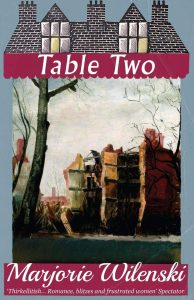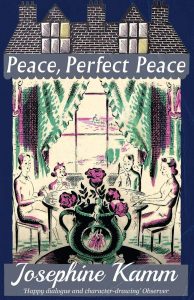Table Two and Peace, Perfect Peace
 Table Two by Marjorie Wilenski
Table Two by Marjorie Wilenski
224pp, paperback, £9.99
Peace, Perfect Peace by Josephine Kamm
192pp, paperback, £9.99
Furrowed Middlebrow Books published by Dean Street Press
Reviewed by Shirley Whiteside
Dean Street Press’ reissue of several charming books by forgotten women writers, under the Furrowed Middlebrow banner, continues to impress with two delightful books set during and just after World War II.
Table Two, by Marjorie Wilenski, takes place during the early part of the war and follows the fortunes of the women employed as translators at the (fictional) Ministry of Foreign Intelligence in London. Elsie Pearne, a rather embittered middle-aged woman, works at Table Two, and Wilenski provides some pithy portraits of her colleagues. Mrs Doweson ‘had a sweet and mild expression but she was nevertheless a tough old woman, tenacious and formidable,’ while the loquacious Mrs Just is characterized with ‘talk bursting out of her lips and her body bursting out of her clothes.’ Anne Shepley-Rice, whose family had lost their fortune, is a new recruit, struggling to come to terms with working for a living. Wilenski draws on her own working experiences to produce an environment that anyone who has worked in an office will recognize. There are the curious routines, petty jealousies, long-running feuds, and power struggles. As the bombing reaches London, these varied women find their own way to cope with life in wartime. This novel provides a prosaic picture of ordinary people in extraordinary circumstances, leavened by Wilenski’s eye for a telling detail and dry wit.
 Peace, Perfect Peace by Josephine Kamm is set in the strange limbo period just after the Second World War. Whilst the fighting is over, rationing and severe food shortages continue. Men and women who were in the military are arriving home in dribs and drabs, and civilians who undertook war work find themselves out of a job. Clare, a writer, feels cast adrift as her intelligence job is over and her married lover is proving more elusive than usual. She spends some time in the country with her friend Joanna, who has been looking after her two grandchildren while her son is in the military and her daughter-in-law is doing war work. Joanna has formed a loving bond with Giles, her sensitive grandson, and dreads the day when he goes back to live with his parents. Frances, Giles’ mother, finds herself in a draughty London flat and a large part of her day spent having to queue at the shops in order to buy food. Thick layers of dust cover everything no matter how often she manages to clean the flat, an unwelcome legacy of the widespread destruction of the city. She looks forward to her husband coming home but wonders how their relationship will weather the changes that the war has wrought.
Peace, Perfect Peace by Josephine Kamm is set in the strange limbo period just after the Second World War. Whilst the fighting is over, rationing and severe food shortages continue. Men and women who were in the military are arriving home in dribs and drabs, and civilians who undertook war work find themselves out of a job. Clare, a writer, feels cast adrift as her intelligence job is over and her married lover is proving more elusive than usual. She spends some time in the country with her friend Joanna, who has been looking after her two grandchildren while her son is in the military and her daughter-in-law is doing war work. Joanna has formed a loving bond with Giles, her sensitive grandson, and dreads the day when he goes back to live with his parents. Frances, Giles’ mother, finds herself in a draughty London flat and a large part of her day spent having to queue at the shops in order to buy food. Thick layers of dust cover everything no matter how often she manages to clean the flat, an unwelcome legacy of the widespread destruction of the city. She looks forward to her husband coming home but wonders how their relationship will weather the changes that the war has wrought.
Both novels are entertaining, with interesting storylines and vivid characters. However, the first-hand experiences of the authors, living through the Second World War and its long aftermath, give them added significance. The dramatic changes in society, with more women than ever going out to work and doing previously male-only jobs, are well defined. Even the changes in morality brought about by the ever-present spectre of death are addressed with little condemnation of Clare over her affair with a married man.
This imprint is giving the novels of some excellent but overlooked women writers a chance to find new readers, and one hopes that literature-lovers will show their gratitude by purchasing a number of these books.
